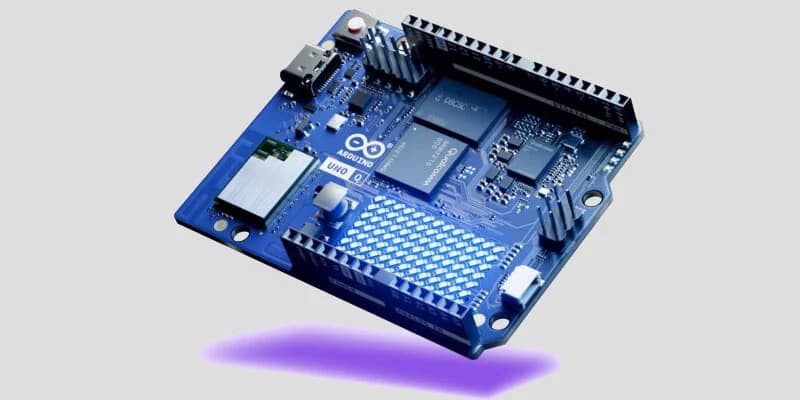Education, Educational articles
Arduino UNO Q – Next-Gen Hybrid Board for Makers & AI
The Arduino UNO Q is a powerful leap forward in the Arduino family, blending a Linux-capable processor with a real-time microcontroller in a familiar UNO form-factor. (arduino.cc) Whether you’re a maker, educator, or professional, the UNO Q opens up possibilities for AI, machine vision, IoT, robotics and more.
What is Arduino UNO Q?
UNO Q features a hybrid “dual-brain” architecture:
- A Qualcomm Dragonwing™ QRB2210 MPU running Debian Linux, with quad-core CPU and GPU for advanced computing. (arduino.cc)
- A STM32U585 real-time MCU (Arm® Cortex-M33) for hardware control and deterministic tasks. (docs.arduino.cc)
It supports WiFi 5 (2.4/5 GHz), Bluetooth 5.1, USB-C, Qwiic connector for Modulino nodes, and maintains compatibility with standard UNO shields and libraries. (arduino.cc)
Key Features
- Runs full Linux + supports Arduino sketches, Python, containerized AI models via Arduino App Lab. (arduino.cc)
- Classic UNO form-factor for compatibility with many shields and ecosystem.
- High-performance hardware for edge-AI, vision, robotics.
- Dual-brain architecture allowing simultaneous high-level computing and real-time hardware control.
- Expandable hardware: Qwiic, UNO headers, bottom connectors for camera/display. (docs.arduino.cc)
What can you use it for?
- Edge AI and machine vision projects: camera input, image processing on board.
- Smart home / automation systems: IoT devices with advanced connectivity and processing.
- Robotics: advanced robots needing both high-level logic and hardware real-time control.
- Educational & prototyping: teaches embedded Linux + microcontroller in one board.
- Industrial applications: thanks to its performance, it can be used in industrial-grade IoT and automation. (DigiKey)
Why choose UNO Q?
If you need more than a standard microcontroller board, and want the flexibility of running Linux, Python and AI alongside hardware control in one board, UNO Q is a future-proof choice.


